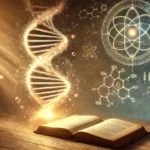Exploring the scientific, philosophical, and religious aspects of the evolution vs. creationism debate
This article delves into the age-old question: is there a conflict between evolution and creationism? We’ll examine both perspectives, their origins, key arguments, and the ongoing debate in society today.
The origins of evolution and creationism
The origins of evolution and creationism are deeply rooted in the ancient quest to understand our place in the universe. From the poetic musings of Greek philosophers like Pindar and Heraclitus, who spoke of constant change and transformation, to the more structured theories of Aristotle and his idea of a static world, the debate between evolution and creationism has been a continuous thread in human thought.
Fast forward through time, and we see these ancient philosophies morph into scientific theories. The Clockwork Universe theory proposed by thinkers like Ibn al-Nafis and later supported by the likes of Descartes, suggested a mechanistic view of life, where everything operated like gears in a machine. This view laid the groundwork for future scientific inquiries into natural processes.
It was during the 19th century that the debate truly heated up with the publication of Charles Darwin’s The Origin of Species. Darwin’s theory of evolution by natural selection challenged not just biological understanding but also religious beliefs, setting the stage for a profound conflict. The idea that species evolve over time through adaptation and survival was a radical shift from the prevailing creationist view, which held that life forms were created in their current form by a divine being.
Creationism, on the other hand, has its roots in religious texts like the Bible and the Torah, which describe a creation event where God creates everything in six days. This perspective often emphasizes divine intervention as the driving force behind life’s diversity. The idea that species remained unchanged since their creation has been a central tenet of many religious communities.
Both theories, while rooted in different philosophical and cultural contexts, have shaped our understanding of the natural world. Evolution and creationism continue to be debated not just by scientists but also by philosophers and theologians, making this a fascinating area of study that bridges science, religion, and philosophy.
Key principles of evolution and creationism
When we delve into the key principles that underpin evolution and creationism, it’s like comparing two vast landscapes, each offering a different perspective on the same terrain—life itself. Evolution, grounded in natural selection, posits that species change over time due to random genetic variations and environmental pressures. This process, often likened to a sculptor shaping stone into intricate forms, can be seen as nature’s relentless artist. Charles Darwin’s concept of natural selection is the backbone of this theory, where organisms best adapted to their environment tend to survive and reproduce in greater numbers.
In contrast, creationism, whether it follows a literal interpretation of religious texts or the more general idea of intelligent design, emphasizes the role of an omnipotent being in creating life. Imagine this as painting a perfect masterpiece all at once, rather than through a gradual process. Intelligent design proponents argue that certain structures in nature are so complex and specific that they could not have come about by chance alone, suggesting a guiding hand behind their creation.
While evolution focuses on the gradual, step-by-step changes over countless generations, creationism often looks for sudden, complete forms of life—like finding a fully formed statue rather than pieces of stone slowly taking shape. Both theories are compelling in different ways, but they approach the question of life’s origins from entirely distinct angles.
It’s intriguing to ponder which explanation better fits our current understanding of the world. The theory of evolution provides a framework for explaining diversity and complexity through natural processes, whereas creationism offers a narrative that aligns with certain religious beliefs. Both have their strengths and weaknesses, and it’s this juxtaposition that keeps the debate alive and engaging.
As we explore further into the evidence supporting evolution, remember how each theory tries to explain our place in the universe, painting different but equally valid pictures of where we came from. The challenge lies not just in choosing between them, but in understanding both perspectives deeply to appreciate their unique contributions.
The scientific evidence for evolution
When it comes to the scientific evidence for evolution, one can hardly ignore the vast array of empirical data that supports this theory. Imagine peeling back the layers of time, like slowly revealing a hidden treasure map. The fossil records act as our guiding beacons, pointing us towards the history of life on Earth.
Think about it: Could we really believe that all these diverse species have existed and changed over millions of years without any evidence? Fossil records offer us a timeline of evolution, showing how organisms have adapted to their environments. These fossils are like snapshots in time, capturing the essence of our planet’s past.
The genetic code is another compelling piece of evidence. Imagine DNA as an intricate language written on tiny strands within every cell. This code contains the instructions for building and maintaining living things. When we compare the genomes of different species, we find that they share a surprising amount of similarity. For example, humans and chimpanzees have remarkably similar DNA sequences, which supports the idea that we shared a common ancestor.
Moreover, genetic mutations play a crucial role in evolution. Mutations are like natural experiments, providing variations within populations that can be selected for or against over generations. These changes can lead to new species or adaptations that help organisms survive in their environments. The fact that we see these mutations occurring and affecting traits is a powerful testament to the theory of evolution.
The evidence from molecular biology further strengthens our understanding. Comparative studies across different species reveal patterns consistent with evolutionary relationships. For instance, the presence of vestigial structures or homologous organs in various organisms provides clues about shared ancestry. These findings are not just random coincidences but clear indicators of a common evolutionary history.
In essence, the evidence for evolution is both extensive and compelling. From the fossil records to genetic analysis, every piece of evidence builds upon the next, painting a coherent picture of how life has evolved over millions of years. The complexity and interconnectedness of this evidence make it difficult to dismiss evolution as merely a theory.
So, when we look at all this empirical data, can we still believe that evolution is just a guess or a figment of scientists’ imagination? The answer seems to lie in how open we are to exploring the natural world and understanding its intricate mechanisms. Evolution isn’t just about rocks and genes; it’s about uncovering the stories hidden within our very existence.
The religious arguments for creationism
When discussing the religious arguments for creationism, one cannot overlook the foundational text of the Christian Bible, specifically Genesis. How can we reconcile the six-day creation described in Genesis with the millions of years proposed by evolutionary scientists? Some argue that these accounts are not meant to be taken literally but rather as metaphorical stories. However, many adherents believe these passages should be interpreted as historical records.
What if the Bible and science were speaking different languages? This tension often arises because both sides use the same text with very different meanings in mind.
In addition to Genesis, creationists often appeal to intelligent design (ID), a concept that posits certain features of the universe and living things are best explained by an intelligent cause, not an undirected process such as natural selection. Proponents argue that complex biological systems are too intricate to have evolved through random mutations alone.
Is it possible for science and religion to coexist without contradiction? This question becomes even more poignant when considering the vast array of evidence supporting evolution. How do we reconcile these seemingly conflicting narratives within our belief systems?
The debate over creationism and intelligent design extends beyond just religious texts; it encompasses broader philosophical and theological questions about the nature of God’s role in the cosmos. Some creationists argue that an omnipotent creator would naturally leave behind evidence of his handiwork, which they see as evident through the complexity of life.
Does finding a watch on a beach make us assume there was a watchmaker? This argument is often cited to support intelligent design by drawing parallels between natural phenomena and man-made objects.
The intersection of religious beliefs with scientific theories can be complex and multifaceted. It challenges individuals to reconcile their faith with the empirical evidence presented by scientists, inviting a deeper exploration into what it means to hold both knowledge and belief simultaneously.
How do we bridge the gap between what we see in nature and what our scriptures tell us? This chapter invites readers to delve into the rich tapestry of religious arguments for creationism while considering the broader implications for science, faith, and understanding.
The philosophical implications of both theories
Philosophically, both evolution and creationism offer profound insights into the nature of reality, morality, and purpose. Can we reconcile these two theories without diminishing their rich philosophical implications? How do they shape our understanding of existence itself?
Evolution, with its emphasis on natural processes and adaptation, challenges us to question teleological views that suggest a predetermined purpose in nature. If everything around us is the result of blind chance, does this mean we must abandon any notion of inherent meaning or design? Or can evolution be seen as part of a larger narrative where purpose emerges from complexity rather than being preordained?
Creationism, on the other hand, often introduces a teleological perspective by attributing intentions and goals to an external creator. This raises questions about the nature of causality: if everything has a reason for its existence, does this necessarily imply a singular, all-powerful designer? Or could creationism be seen as a poetic expression of our human need to find order in chaos?
Both theories engage deeply with ethical and moral considerations. Evolution might lead us to explore the concept of survival and competition, prompting questions about altruism and cooperation in nature. Do these behaviors reflect an inherent morality, or are they simply adaptations for survival? Meanwhile, creationism often addresses issues of ethics and right and wrong through a framework that emphasizes divine command.
Moreover, both evolution and creationism offer different lenses to understand the human condition. Evolution might help us appreciate our place in the natural world, seeing humanity as part of a continuum rather than isolated. Creationism, however, might provide comfort by suggesting that humans have a special role or significance within this larger framework.
Ultimately, the philosophical debate between evolution and creationism is not just about choosing one view over another; it’s about understanding the multifaceted nature of reality and our place in it. Can we find common ground where both theories enrich rather than conflict with each other? The ongoing discussion might lead us to a more holistic appreciation of life, embracing both the order seen in creationism and the complexity witnessed in evolution.
The ongoing debate: finding common ground
Can we find common ground amidst the fierce debate between evolution and creationism? It’s a question that has long divided scholars, scientists, and religious leaders alike. Are these two concepts inherently at odds, or can they coexist in a way that respects both scientific evidence and religious beliefs?
One possible starting point for dialogue is the idea of common ancestry. While evolutionists see it as a process where all life forms share a common origin, creationists often view it through the lens of a single creation event. Could there be middle ground here? Some scientists and theologians argue that common ancestry can be seen as part of a broader narrative of creation, where diversity in species reflects God’s creativity and purpose.
Another area ripe for agreement is the process of adaptation. Both sides recognize the importance of natural selection and adaptation in shaping life forms over time. Can we not appreciate how these processes reflect divine wisdom and order without dismissing them as mere random chance?
The concept of environmental stewardship also presents an opportunity for mutual understanding. Many religious texts emphasize humanity’s role in caring for the earth, a principle that aligns well with ecological concerns raised by evolutionary biologists. By working together, we can promote sustainable practices and protect biodiversity from both ethical and practical perspectives.
Perhaps most importantly, let us recognize that the debate is not just about science versus religion. It’s also about how we interpret evidence and construct narratives to make sense of our world. Can we engage in respectful dialogue, acknowledging the complexity and nuance of both positions?
In conclusion, while the conflict between evolution and creationism remains deeply entrenched, there are indeed areas where both sides can find common ground. By focusing on these shared values and goals, we may be able to foster a more inclusive and productive conversation about our place in the natural world.
Conclusion
 By understanding the nuances of each perspective, we can foster dialogue and promote mutual respect for diverse beliefs while promoting scientific literacy.
By understanding the nuances of each perspective, we can foster dialogue and promote mutual respect for diverse beliefs while promoting scientific literacy.











